Samuel James Staples (1863–1930)
Staples was an early businessman, Councillor, Town Mayor and active community volunteer.
Samuel James Staples was one of the early builders of the Town of Carman. He was in his third term as mayor of Carman when he died of cancer on August 21, 1930.
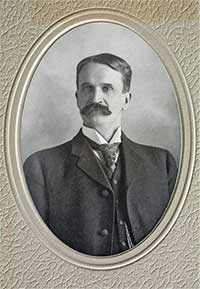
S.J. Staples was born in Manvers, ON in 1863. He came to Carman in 1899, accompanied by his wife Elizabeth (née Ecclestone) and their children, Ernest and Ellen. Until 1902, S.J. Staples worked in his brother Richard’s dry goods store, located at what is now the northwest corner of Hwy #13 and PR 245. He then opened his own store in partnership with E. Abercrombie, the North End Grocery and Clothing Store, next to the C.N.R. Station (now GPAC). His brother Richard moved to Elm Creek where he also operated a store. In 1904, Abercrombie left the partnership and son Ernest joined the store.
In 1907, S.J. Staples took out a five-year lease on commercial space in what was then the Sons of England building on Fournier St. (1st Street SW), the current location of Home Hardware. The store was then renamed S.J. Staples and Son, General Merchants.
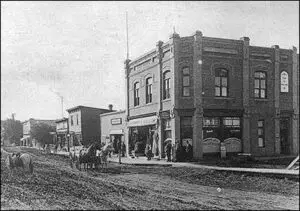
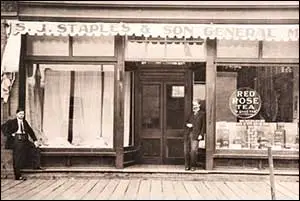
S.J. Stapes on right
When the lease ended in October, 1912, the store was moved from S.O.E. Block further south to what is now 34-1st St. SW, the present location of Carman Pharmacy.
On March 5, 1918 Ernest joined the 43rd Battalion of the Canadian Infantry (Manitoba Regiment). Sadly, he did not come back from the war. Ernest lost his life on Sept 28, 1918; he is buried in Crest Cemetery, near Cambrai, France.
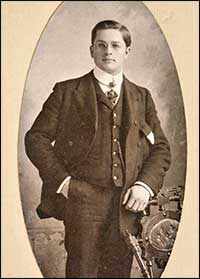
Ernest Staples, before the war

His father continued in business under the name of S.J. Staples until November 1918 when he sold to Mr. J.G. McGowan of Treherne, Manitoba.
S.J. Staples was known for his active interest in the affairs of Carman and district. He served as a town councillor before becoming mayor of Carman. His obituary (Dufferin Leader, 1930-08-28) attests to his “unremitting attention to matters…and constant effort to keep the municipal machinery working smoothly. He was one of the chief workers in the movement for town beautification.” This included offering prizes for the best gardens and home surroundings.
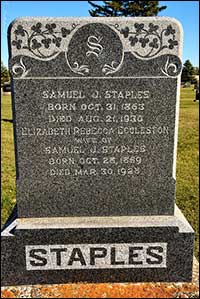
S.J. Staples’ grave
He also was active in the community as an elder in the Wesley Church and as a member of the Independent Order of Oddfellows (I.O.O.F.). His duties with the I.O.O.F. included serving as provincial Grand Patriarch. The order was prominently represented at his funeral service. S.J. Staples is buried in Carman’s Greenwood Cemetery.
S.J. Stapes has six surviving great-grandchildren, one of whom, Edwin Pritchard, currently is living in the Carman area and following his great-grandfather’s tradition of community service.
P.S. We should point out that this profile is a good example of the teamwork behind most C/D MHAC projects. The Staples name first came to our attention through the research of member Shirley Snider, who, for the past decade, has been tracing the location and ownership of various Carman businesses. The S.J. Staples’ obituary was located on the front page of a 1930 Dufferin Leader, thanks to our research in early local newspapers. But the jackpot turned out to be the family archive compiled by Staples’ descendants, including Edwin Pritchard and his cousins. This impressive collection recently came to C/D MHAC attention through discussions of the growing need for safe storage of family histories and documents. And thereby hangs yet another tale.
I.O.O.F. Among his many achievements, S.J. Staples rose to prominence in the Independent Order of Odd Fellows. The I.O.O.F. was formed in 18th Century England as a mutual self-help society with the motto “Friendship, Love and Truth”. The origin of the unusual name “Odd fellows” is uncertain but is believed to come from the fact that members devoted their time to helping others. This was unusual for fraternities of the time so they were known as “those odd fellows.”
The I.O.O.F. also differed from many other societies of the day in being “non-partisan, non-sectarian, and welcoming of all people without regard to religion, race, gender, sexual orientation, and national origin”, based on their belief in the “universal brotherhood of Man and the fatherhood of God”. As evidence that they didn’t just pay lip-service to these principles, the I.O.O.F. were the first fraternal order to admit women to their companion order, the Rebekahs, who also were active in the local community.
